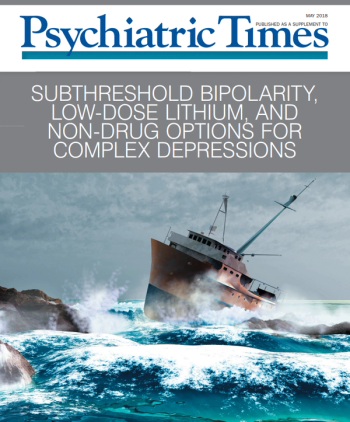
News



An understanding of evidence-based interventions can assist with the management of physician work-associated trauma within the unique setting of health care environments.



Given the brain's neuroplasticity, it’s to our benefit to make our lifetime experiences as positive and hilarious as possible



How can psychiatrists help patients address the negative effects of poverty on their mental health? Take the quiz and test your knowledge.

If an appropriate treatment is started promptly, the majority of psychiatric emergencies can be resolved within 24 hours without inpatient hospitalization.

All summer southwest wind stirs the weeping willows the way my breath disturbs a settled life when I whisper the cancer diagnosis...

Findings from a new study may have implications in relation to early childhood interventions and later targeted pharmacotherapies for MDD.

Cortisol and thyroid hormone levels may help predict response to cholinesterase inhibitors in patients with Alzheimer disease.

Do personality disorders get a bad rap? Take the quiz and learn more.

The authors discuss two fundamental misconceptions: the myth of the patient’s autonomy, and the myth of the incurability of the patient’s illness.

In psychiatry, a “prosumer” is a mental health professional who has personally experienced mental illness. The prosumer can self-disclose that connection or not-Frederick Frese, PhD self-disclosed often, loudly, and clearly.

Recent findings suggest that the magnitude of efficacy for most antidepressants compared with placebo may be more modest than previously thought.

Since the choice of treatments for a primary bipolar I disorder major depressive episode versus a unipolar major depressive episode are significantly different, this information will help guide clinicians in how to proceed.

The most challenging aspect of pseudobulbar affect is differentiating it from depression. Episodes of uncontrollable, sudden, and even inappropriate emotions may point to neurologic or psychiatric conditions.

Despite the scope and magnitude of rising rates of depression and suicide, the field of psychiatry may be witnessing a turning point.

In considering how best to disseminate the many psychotherapeutic techniques to practicing clinicians, the author reviews findings and changes to guidelines on depression treatments.

The use of biomarkers to assist with optimizing treatment decisions for depression has been receiving increasing attention. Here is an overview of the challenges and barriers that must be overcome before therapeutic markers can effectively be utilized in practice.

Walter Benjamin’s suicide is especially interesting as a bridge from the Freudian psychosocial era of hysteria-neuroses to the current era of the borderline-narcissist.

If we fail to cultivate and exercise virtues such as wisdom, curiosity, intellect, aesthetic sensitivity, compassion, empathy, and generosity, we fail to exemplify human flourishing.

Bingeing on news about the latest White House rumpus has escalated exponentially since the election. Whatever their political views, patients are haunted by an inchoate sense that the wheels are coming off the car, with nary a mechanic in site.

In this novel, we join New York consultation-liaison psychiatrist Dr Millard Salter for what he intends to be his final day on earth.

A gentle reminder to patients of all ages to “get moving” may go a long way in decreasing the risk of future depression.

Where are the crusading editorial boards who decide that the inadequacy of mental health care is such a public health emergency that ongoing investigative journalism is needed?

Download this educational supplement to review the challenges of managing bipolar disorder.

In this podcast, author Mark Lukach shares his experiences as the loved one of someone with new onset symptoms of mania, depression, suicidality, and psychosis.